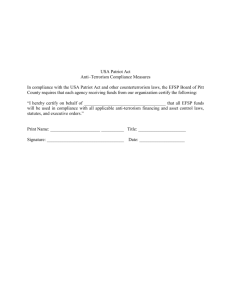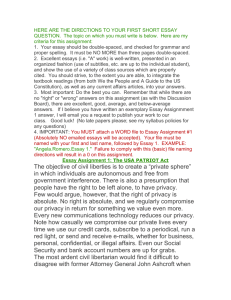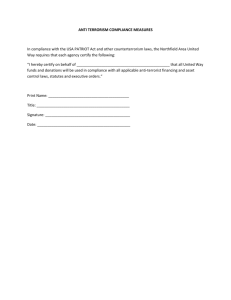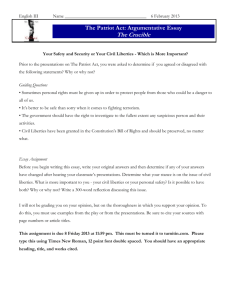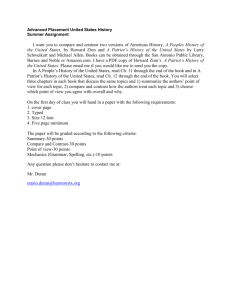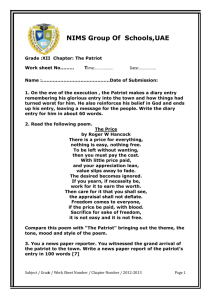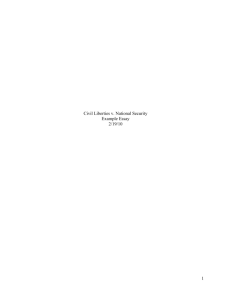Source 3
advertisement
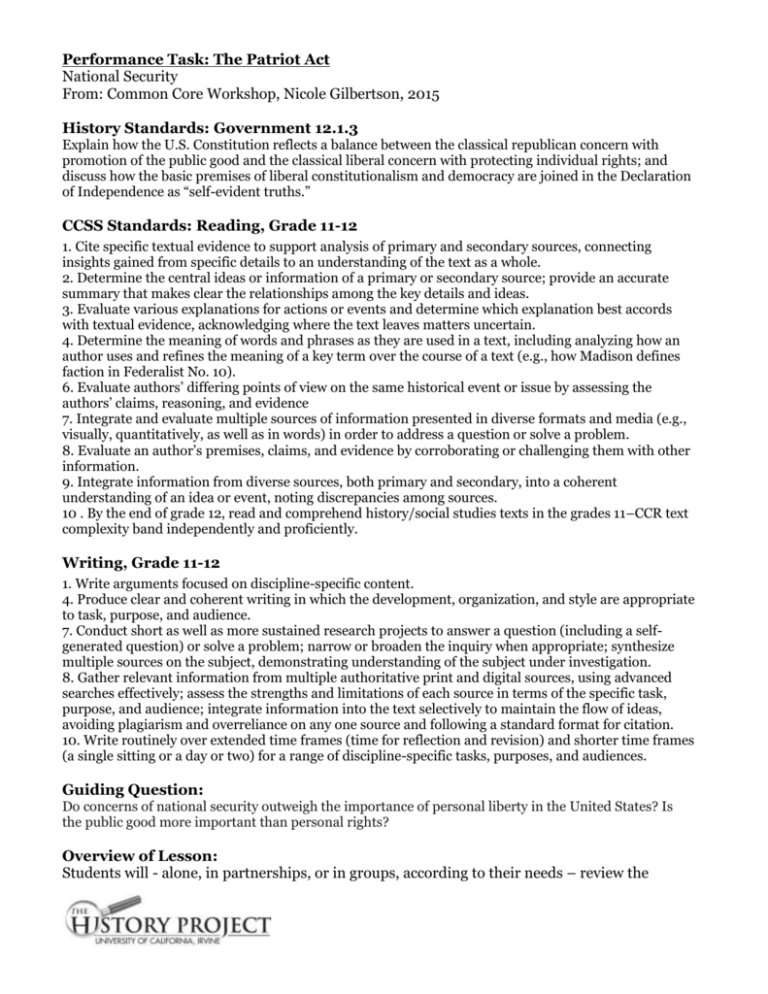
Performance Task: The Patriot Act National Security From: Common Core Workshop, Nicole Gilbertson, 2015 History Standards: Government 12.1.3 Explain how the U.S. Constitution reflects a balance between the classical republican concern with promotion of the public good and the classical liberal concern with protecting individual rights; and discuss how the basic premises of liberal constitutionalism and democracy are joined in the Declaration of Independence as “self-evident truths.” CCSS Standards: Reading, Grade 11-12 1. Cite specific textual evidence to support analysis of primary and secondary sources, connecting insights gained from specific details to an understanding of the text as a whole. 2. Determine the central ideas or information of a primary or secondary source; provide an accurate summary that makes clear the relationships among the key details and ideas. 3. Evaluate various explanations for actions or events and determine which explanation best accords with textual evidence, acknowledging where the text leaves matters uncertain. 4. Determine the meaning of words and phrases as they are used in a text, including analyzing how an author uses and refines the meaning of a key term over the course of a text (e.g., how Madison defines faction in Federalist No. 10). 6. Evaluate authors’ differing points of view on the same historical event or issue by assessing the authors’ claims, reasoning, and evidence 7. Integrate and evaluate multiple sources of information presented in diverse formats and media (e.g., visually, quantitatively, as well as in words) in order to address a question or solve a problem. 8. Evaluate an author’s premises, claims, and evidence by corroborating or challenging them with other information. 9. Integrate information from diverse sources, both primary and secondary, into a coherent understanding of an idea or event, noting discrepancies among sources. 10 . By the end of grade 12, read and comprehend history/social studies texts in the grades 11–CCR text complexity band independently and proficiently. Writing, Grade 11-12 1. Write arguments focused on discipline-specific content. 4. Produce clear and coherent writing in which the development, organization, and style are appropriate to task, purpose, and audience. 7. Conduct short as well as more sustained research projects to answer a question (including a selfgenerated question) or solve a problem; narrow or broaden the inquiry when appropriate; synthesize multiple sources on the subject, demonstrating understanding of the subject under investigation. 8. Gather relevant information from multiple authoritative print and digital sources, using advanced searches effectively; assess the strengths and limitations of each source in terms of the specific task, purpose, and audience; integrate information into the text selectively to maintain the flow of ideas, avoiding plagiarism and overreliance on any one source and following a standard format for citation. 10. Write routinely over extended time frames (time for reflection and revision) and shorter time frames (a single sitting or a day or two) for a range of discipline-specific tasks, purposes, and audiences. Guiding Question: Do concerns of national security outweigh the importance of personal liberty in the United States? Is the public good more important than personal rights? Overview of Lesson: Students will - alone, in partnerships, or in groups, according to their needs – review the sources below and decide which sources support each side of the argument. They will then write an argumentative essay, including a claim and counterclaim, to advise the President on the best course of action. 12th Grade Performance Task Issue 1: Do concerns of national security outweigh the importance of personal liberty in the United States? Is the public good more important than personal rights? The Sedition Act of 1798 authorized the president to imprison or deport those accused of speaking against the U.S. government. Although purportedly an effort to minimize the threat of French hostilities, most believe that the act was more effectively used against political opponents. If a legitimate concern for public safety existed/exists should the freedom of speech ever be restricted for the sake of national security? Issue 2: Do concerns of national security outweigh the importance of personal liberty in the United States? Is the public good more important than personal rights? Shortly after the terrorist attacks on September 11, 2001, the Patriot Act was signed into law for the purpose of fighting terrorist threats and strengthening domestic security. The law expanded government and law enforcement measures to access information and pursue alleged terrorists. Critics argue that such expansive government power undermines civil liberties and ultimately, democracy. Others claim it has been successful in apprehending terrorist and is essential to national security and saving lives. Directions for Part 1 You will now examine and analyze a variety of sources on the topic of the Patriot Act. Take notes because you may want to refer to your notes while writing your argumentative essay. You can reexamine any of the sources as often as you like. Directions for Part 2 You will now review your sources, take notes, and plan, draft, revise, and edit your essay. You may use your notes and refer to the sources. Now read your assignment and the information about how your argumentative essay will be scored; then begin your work. Your assignment: You are a political advisor to the President. As a consequence of the Wikileaks scandal (and the consequent exposure of widespread government surveillance) civil liberties organizations are demanding a repeal of the Patriot Act. Other organizations are calling for tighter security measures in light of increasing terror threats. You must advise the President on whether national security concerns outweigh privacy and individual liberties. In presenting your case, you must provide evidence to defend your claim and demonstrate you understand opposing views on the matter. Source 1: Washington Post, “Surprise! Controversial Patriot Act power now overwhelmingly used in drug investigations” October 29, 2014 One of the more controversial provisions of the Patriot Act was to broaden the “sneak-and-peek” power for federal law enforcement officials. The provision allows investigators to conduct searches without informing the target of the search…. The massive Patriot Act of course passed overwhelmingly, including the sneak-and-peek provision, despite the fact that only a handful of members of Congress had actually read it. (Not to mention the public.) More than a decade later, the Electronic Frontier Foundation has published an analysis on use of the sneak-and-peek power. Just as critics predicted, it’s now a ubiquitous part of federal law enforcement. Law enforcement made 47 sneak-and-peek searches nationwide from September 2001 to April 2003. The 2010 report reveals 3,970 total requests were processed. Within three years that number jumped to 11,129. That’s an increase of over 7,000 requests. Exactly what privacy advocates argued in 2001 is happening: sneak and peak warrants are not just being used in exceptional circumstances—which was their original intent—but as an everyday investigative tool. And as critics predicted, it is overwhelmingly used in cases that have nothing to do with terrorism. But even if you’re a cynic, it’s pretty shocking just how little the power is used in terrorism investigations. …Out of the 3,970 total requests from October 1, 2009 to September 30, 2010, 3,034 were for narcotics cases and only 37 for terrorism cases (about .9%). Since then, the numbers get worse. The 2011 report reveals a total of 6,775 requests. 5,093 were used for drugs, while only 31 (or .5%) were used for terrorism cases…. Source 2: “The PATRIOT Act and the Constitution: Five Key Points” By Jena Baker McNeill February 10, 2011, The Heritage Foundation. Org Here are five key points about the PATRIOT Act: 1 It protects civil liberties and provides for the common defense. The Constitution requires the President and Congress to respect and defend individual civil liberties but also provide for the common defense. The Constitution weighs heavily on both sides of the debate over national security and civil liberties—it is important to recognize both factors. 2 Expectation of privacy is not unlimited. The Supreme Court has ruled that Americans enjoy a “reasonable” expectation of privacy; however, this is not an unlimited expectation of privacy. This means that anything one exposes voluntarily to the public—or even to a third party—is not considered protected. Congress of course can expand these rights (and it has repeatedly); however, these protections yield to criminal and national security investigations. 3 The law provides significant safeguards. The PATRIOT Act does not provide investigators with unfettered power to spy on innocent Americans. What it does do is ensure that national security investigators have the same tools at their disposal to investigate terrorists that law enforcement agents have to investigate and prosecute drug dealers and rapists. These tools come with significant procedural safeguards, oversight, and reporting requirements and are subject to routine and aggressive oversight by the FISA court and Congress. 4 It has passed constitutional muster. No single provision of the PATRIOT Act has ever been found unconstitutional. This is a testament to the act’s limited applicability, procedural safeguards, and extensive oversight mechanisms—as well as the fact that it often provides more protections than are afforded in criminal proceedings. Disagreements over the role of government are different from actual abuse. Mere expansion of executive authority in the context of national security investigations alone does not in itself create actual abuse. Certainly, there are fundamental disagreements over the role of the executive branch during wartime. However, careful monitoring and vigilant oversight are oftentimes the answer to potential abuses of power—not all-out prohibition… Source 3: November 25, 2014 New York Times “U.N. Urges Protection of Privacy in Digital Era” UNITED NATIONS — The United Nations adopted a resolution on Tuesday urging all countries to protect the right to privacy in digital communications and to offer their citizens a way to seek “remedy” if their privacy is violated. Though not legally binding, the resolution signaled growing international attention to the issue of digital privacy, which it described as a human right… Germany and Brazil led the effort to seek the resolution after their leaders, Chancellor Angela Merkel and President Dilma Rousseff, expressed anger over reports, fed by documents harvested by the former National Security Agency contractor Edward J. Snowden, that American intelligence agencies had spied on their communications. “Without the necessary checks,” said the German ambassador, Harald Braun, “we risk turning into Orwellian states, where every step of every citizen is being monitored and recorded in order to prevent any conceivable crime.”… The resolution was backed by 65 co-sponsors, but not by the United States, Australia, Britain, Canada or New Zealand, which make up an intelligence alliance known as the Five Eyes…. The resolution also for the first time urged governments to “provide individuals whose right to privacy has been violated by unlawful or arbitrary surveillance with access to an effective remedy….” The United States Senate last week blocked a bill that would restrict the ability of the National Security Agency to collect records of Americans’ telephone calls in bulk. On Tuesday, Kelly L. Razzouk, a senior human rights adviser to the United States Mission to the United Nations, told the human rights committee that the United States believed in privacy rights as a pillar of democratic societies, while welcoming “the resolution’s recognition that concerns about security may justify the gathering of certain sensitive information, in a manner consistent with international human rights obligations.” Source 4: PATRIOT Act Has Major Advantages by Kevin Ryan, The Daily Californian, May 31 2005 In the wake of the horrific events of 9/11, Congress enacted the PATRIOT Act, giving federal law enforcement important tools to combat terrorism. These have been indispensable in protecting Americans while preserving liberties the Constitution guarantees us. But at the end of 2005, a number of the act's most important provisions are scheduled to "sunset." I hope these 16 provisions are made permanent, ensuring that all the necessary legal tools remain available to law enforcement. Before discussing several of the hotly debated provisions of the act, I want to remind the public of the following: … Not one civil action has been filed against the government under section 223, which allows citizens to seek damages for any willful violations of the Act; Since its enactment, 395 people have been charged with terrorism related crimes, leading to over 212 convictions. …Another provision that has drawn controversy is Section 213, which authorizes investigators to conduct searches without prior notice to the search target. To conduct a "delayed notice" search, however, 213 requires investigators to demonstrate to a judge that delayed notice is necessary to prevent destruction of evidence, fleeing of a criminal suspect or compromise of an ongoing investigation. Such searches have been standard law enforcement practice for years. Critics often fail to recognize that the act has served as a powerful and effective tool in the fight against terrorism, and that it was not designed to undermine liberty, but to protect and preserve it. Source 5: “Americans say they are pretty comfortable with expanded government surveillance” Christian Science Monitor June 11, 2013 A Pew Research Center Poll conducted from June 6 to 9, prompted by revelations of an extensive domestic surveillance program involving the National Security Agency found that a large number of US citizens are comfortable with trading privacy for security. The poll found that 56 percent of Americans considered it "acceptable" for the NSA to get "secret court orders to track calls of millions of Americans to investigate terrorism," while 41 percent of those surveyed found this "not acceptable."… The overall picture is still one in which large numbers of Americans are deeply frightened by terrorism and want the government to devote significant resources to combat it, notwithstanding the fact that terrorism is not much of an actual threat.... Currently, there are only modest partisan differences in these opinions: 69% of Democrats say it is more important for the government to investigate terrorist threats, even at the expense of personal privacy, as do 62% of Republicans and 59% of independents…. While the poll finds bipartisan support for surveillance, the way the attitudes of Democrats and Republicans have shifted on the issue since President Obama took office is once again evidence of the power of partisanship, rather than principle, in how voters see the world…. The Pew poll found that in January 2006, 75 percent of Republicans found NSA surveillance programs "acceptable," while 61 percent of Democrats found them "unacceptable." In this June 2013 poll, Republican support dropped to 52 percent while Democrat support surged, to 64 percent now finding the surveillance programs acceptable.
